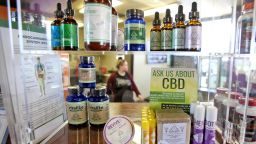The US Food and Drug Administration and the US Federal Trade Commission say they have sent warning letters to six companies for selling products containing delta-8 tetrahydrocannabinol (delta-8 THC) that look strikingly similar to popular snack foods.
Delta-8 THC is the psychoactive cannabinoid from the Cannabis sativa plant, of which marijuana and hemp plants are two varieties.
The agencies said children, and maybe even some adults, could easily confuse these delta-8 THC products – packaged to look like Sour Patch Kids, Doritos, Gushers, Jolly Ranchers, Cheetos, Nerds Ropes and Oreos – for the real thing.
Some of the products have clever names like Double Stuff Stoneos, Medicated DopeRope Bites or Stoney Patch. Others, like delta-8 THC Doritos and Cheetos products, have the same name as the original snack, with THC disclosed in tiny writing at the bottom and back of the packages. The DopeRopeBites that look like Nerds Rope candy use the same Nerds mascot.
The FTC said that the products may violate Section 5 of the FTC Act, which prohibits unfair or deceptive acts in or affecting commerce, including marketing practices that may pose a health or safety risk.
“Marketing edible THC products that can be easily mistaken by children for regular foods is reckless and illegal,” Samuel Levine, director of the FTC’s Bureau of Consumer Protection, said in a news release. “Companies must ensure that their products are marketed safely and responsibly, especially when it comes to protecting the well-being of children.”
There have been more than 125 reports of adverse events from January 2021 through May 2022 among people using edibles with delta-8 THC, the agencies said. At least 10 of the reports specifically mention the copycat products.
The six companies that were sent cease-and-desist letters were Delta Munchies,?Dr. Smoke LLC?(also known as Dr. S LLC),?Exclusive Hemp Farms/Oshipt,?Nikte’s Wholesale LLC,?North Carolina Hemp Exchange LLC?and?The Haunted Vapor Room.
The FTC letters demand that the companies stop marketing edible delta-8 THC products that imitate popular foods using packaging that is “likely to appeal to young children.”
It gave the companies 15 working days to show proof of specific actions they have taken to address the concerns.
The companies have not responded to requests for comment from CNN.
Get CNN Health's weekly newsletter
- Sign up here to get The Results Are In with Dr. Sanjay Gupta every Tuesday from the CNN Health team.
These kinds of products have been a consistent concern. In 2021, the US Centers for Disease Control and Prevention issued an alert to public health departments and doctors about products containing delta-8 THC that can cause health problems, particularly those with “insufficient labeling.”
In June 2022, the FDA warned consumers about the potential dangers of eating foods with delta-8 THC, especially for kids, who are more vulnerable to the effects.
Delta-8 THC can produce similar results to the chemical compound in the marijuana plant that creates the high users feel, but it’s not regulated at the federal level like marijuana is. The chemical most often comes from the hemp plant rather than the marijuana plant.
The Farm Bill of 2018 removed hemp from the Controlled Substance Act. Some states, though, have banned the sale of delta-8 THC.


